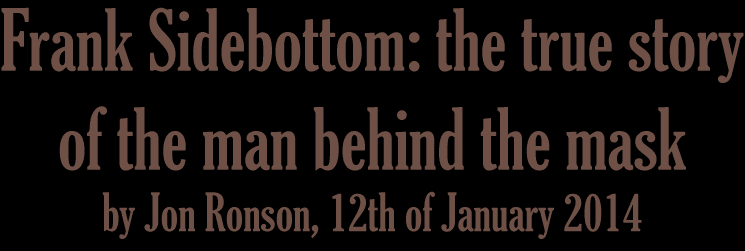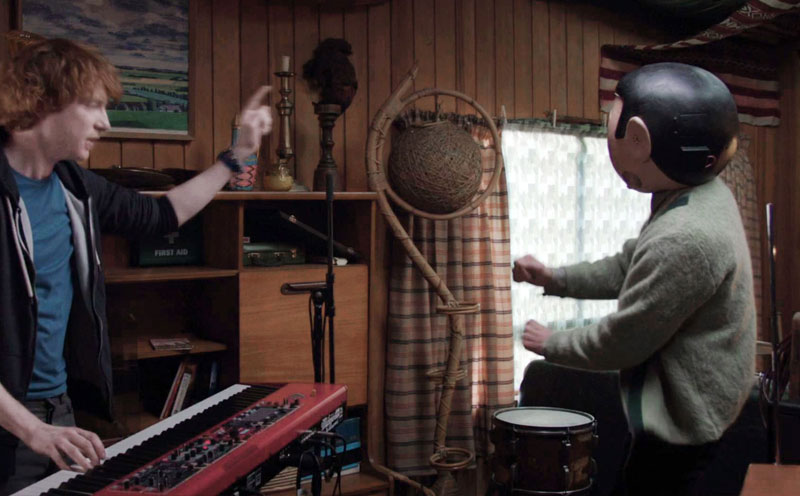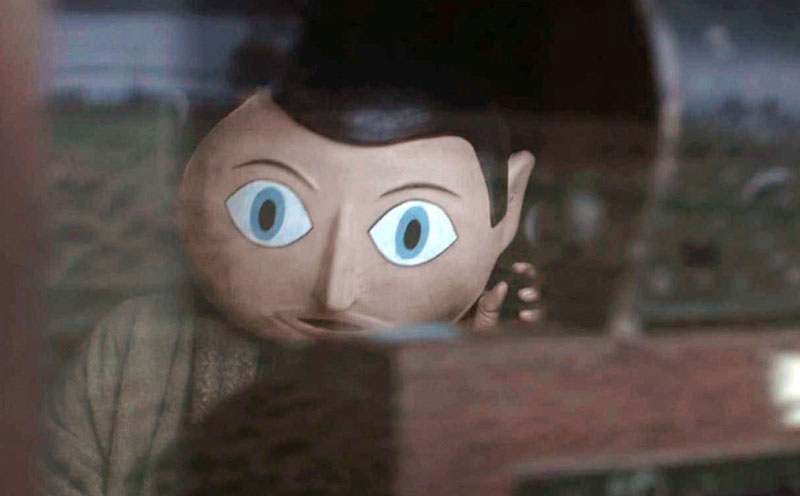
|

|

|

|

|

|

|

|

|

|

|

|


I never understood why Chris sometimes kept Frank's head on for hours, even when it was only us in the van. Under the head Chris would wear a swimmer's nose clip. Chris would be Frank for such long periods the clip had deformed him slightly, flattened his nose out of shape. When he'd remove the peg after a long stint I'd see him wince in pain.
Frank's character was of a child in a northern town remaining assiduously immature in the face of adulthood. He was a paean to ordinariness. But Chris wasn't ordinary. He was chaotic. Sometimes, on the way back from some gig, I'd become aware that we were taking a detour to some house somewhere with some women we somehow met along the way. There would be partying while I sat outside on the sofa.
In the van I'd listen to Chris's stories, trying to understand him. He reminded me of George Bernard Shaw's unreasonable man: "The reasonable man adapts himself to the world; the unreasonable one persists in trying to adapt the world to himself. Therefore all progress depends on the unreasonable man." Chris was the unreasonable man, except the world never did adapt to him and he never made any progress. Like when Frank was asked to support the boy band Bros at Wembley. There were 50,000 people in the crowd. This was a huge stage for Frank – his biggest ever, by about 49,500 people. It was his chance to break through to the mainstream. But instead he chose to perform a series of terrible Bros cover versions for five minutes and was bottled off. The show's promoter, Harvey Goldsmith, was glaring at him from the wings. Frank sauntered over to him and said, "I'm thinking of putting on a gig at the Timperley Labour Club. Do you have any tips?"
We crisscrossed Leeds and Bury and Sheffield and Liverpool playing the same venues over and over again. Time passed and the audiences grew to 750 and sometimes even 1,000. It was consequently baffling for me to become aware of a growing sense of discontent in the van. Chris had been asking friends to perform cameos between the songs on his records. In this spirit he had asked his brother-in-law's friend Caroline Aherne to voice the part of Frank's neighbour, Mrs Merton. Afterwards, Caroline decided to keep Mrs Merton going. She somehow got her own TV show, The Mrs Merton Show. She won a Bafta. Her followup series, The Royle Family, won about seven. The Royle Family Christmas specials attracted audiences of 12 million. And meanwhile we were crisscrossing Manchester and Bury and Leeds and Sheffield and Liverpool in our Transit van.
The band's guitarist Patrick Gallagher told Middles: "It wasn't Caroline's fault. Chris was totally out of control. Whereas, say, Caroline Aherne had a single vision and could just pursue that, Chris might have a fantastic idea, and then, just as the point where it might actually get somewhere, he would spin off onto something completely different. That's OK for a while but it tended to piss people off because they never knew where they stood."
Suddenly everyone around us was becoming famous. My next-door neighbour Mani had a band. They became The Stone Roses. Our driver, Chris Evans, left us to try and make it in radio. By 2000 he was earning ?35m in a year, making him Britain's highest-paid entertainer.

There is always a moment failure begins. A single decision that starts everything lumbering down the wrong path, speeding up, careering wildly, before lurching to a terrible stop in a place where nobody is interested in hearing your songs any more.
With Frank I can pinpoint that moment exactly.
"Chris wants to have a rehearsal," Mike told me one day.
"Why would Chris want to rehearse?" I said.
"To take things up a level," Mike said.
Chris's house was in a normal, nice, modern cul-de-sac. His children were playing outside. His wife, Paula, answered the door and told me to go to the spare bedroom. I walked up, passing the bathroom and glanced in. Staring back at me from the sink was Frank's head.
"In here, Jon," I heard Chris shout.
I opened the bedroom door. And stopped. A man was standing there, maroon shirt tucked smartly into neat black jeans. As I walked in he started playing a tight soul-funk riff with seeming nonchalance, but I understood it to be an act of aggression.
"Who ... are you?" I said.
"I'm Richard," he said. "From the Desert Wolves."
I'd like to say that during the years since Richard the bass player took an instant dislike to me – a dislike that only intensified during the months that followed before the band imploded, and climaxed in him yelling that he'd like to break my "keyboard-playing fingers" – he went on to have a disappointing life. But he didn't. He became one of the world's most successful tour managers, looking after Woody Allen and the Spice Girls. He currently manages the Pixies.
Richard was not the only proper musician Chris brought in. A skilful guitarist and a saxophone player turned up in the spare bedroom too. We began to sound like an excellent 1980s wedding band.
Chris told me to book us the biggest tour we'd ever undertaken. He choreographed it so I would begin the show. I'd walk on stage, alone, into a spotlight, and play a powerful C with my left forefinger. The synth brass tone – the most stirring of all the Casio tones.
We hired a people-carrier instead of a Transit van and set off to our first venue. The mood was pumped. The old band members had a certain avant-garde loucheness. But this new band: I felt like I was in a college sports team. We soundchecked. The place was packed. And then I walked out into the spotlight. And in the space of that first song – our classic Born in Timperley (to the tune of Springsteen's Born in the USA) – the audience veered from fevered anticipation into hoping we were playing a weird joke on them into realising with regret that we were not. The NME savaged us. By the end of the tour we were playing to almost-empty houses.
Chris returned to Manchester to a court summons. He owed ?30,000 in back taxes. On the day of his court appearance the judge told him it was a very serious matter and had he considered a payment plan?
"Would a pound a week suffice, m'lud?" he asked.
"No it would not!" the judge shouted.
Chris never actually said to me: "You're fired." But I began to notice in the listings magazines that he was doing solo shows – just him and a keyboard. They were in the same venues we used to play, then in smaller venues, and then eventually there were no shows at all.
I moved back to London.
